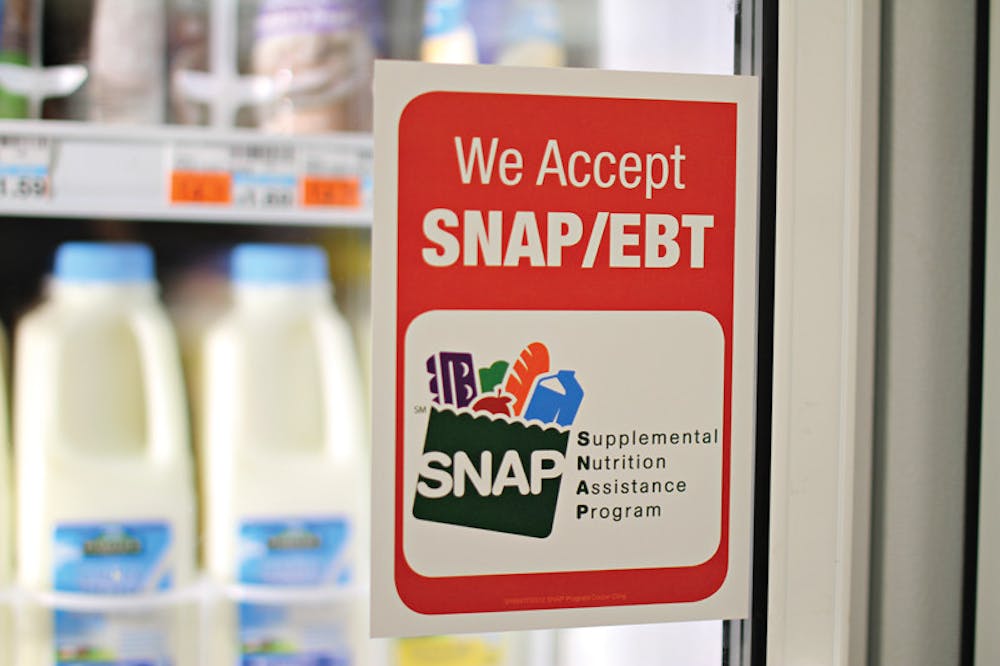Rep. Patricia Morgan, R-Coventry, West Warwick, Warwick, introduced a bill that would require people using electronic benefit transfer cards to show proof of identity to redeem food stamp benefits. The bill aims to reduce fraud in the federal Supplemental Nutrition Assistance Program and was introduced to the House Committee on Health, Education and Welfare March 5, according to a General Assembly press release.
The current fraud rate for Rhode Island’s food stamp program is 0.5-1 percent, while the national average is 1-3 percent, according to the U.S. Department of Agriculture’s website. Critics of the bill are concerned with its impact on low-income individuals who lack photo identification or need someone else to purchase their groceries for them, such as elderly people, said Kathleen Gorman, director of the Feinstein Center for a Hunger Free America and professor of psychology at the University of Rhode Island.
Individuals and families become eligible to receive SNAP benefits if their income is less than 130 percent of the federal poverty level, which is approximately $2,552 per month for a family of four. Applicants can qualify to receive benefits if they are unemployed, employed, receiving a pension or homeless as long as they fall below the income threshold, according to the USDA’s website. Applicants to the program must show proof of identity — such as a birth certificate, resident alien card or a photo identification — according to the SNAP application.
The bill would negatively impact some people receiving food stamps who do not possess photo identification, Gorman said.
Currently 179,127 people participate in SNAP in Rhode Island, according to a USDA report. SNAP benefits grew 0.1 percent from December 2012 to December 2013, according to the report.
Currently 17 percent of Rhode Island’s population relies on food stamps, said Jeffrey Robert, policy analyst for the House Minority Office.
About one in five people in the U.S eligible for SNAP are not enrolled, which leaves out many potential beneficiaries, according to Food Research and Action Center, an organization working to address hunger in the U.S.
SNAP benefits can help local economies, as each dollar in federally funded SNAP benefits generates $1.79 in economic activity, according to FRAC’s website. Gorman said she fears this bill could hurt low-income individuals who could be SNAP beneficiaries.
Robert said Morgan’s bill is not intended to constrain SNAP but rather to decrease the amount of fraud in the system.
Ken Block, Rhode Island gubernatorial candidate, wrote he supports the bill, in an email to The Herald. “I’m very aware of the problem of EBT fraud through my software business, and I am supportive of efforts to address this issue including House Bill 731,” he wrote.
Bills similar to Morgan’s have been previously introduced in Rhode Island, as well as in other states. Some argue this legislation is not a solution to fraud, because the bill is neither consumer nor business-friendly, Gorman said. These bills arose from “an environment of wanting to be tough on fraud, even though it really doesn’t exist,” Gorman said.
Despite the uncertainty surrounding the legislation’s effects, there could be administrative complications. Since one EBT card can currently be shared among a household receiving SNAP benefits, the photo identification requirement would restrain families’ abilities to continue sharing their card, Gorman said.
The bill would affect even those not on food stamps, because federal law states retailers cannot discriminate against SNAP recipients, Gorman said. If the bill passes, retailers would have to check identification for all debit and credit card transactions since they would be required to do so for SNAP beneficiaries. Federal law also requires states to recognize food stamp cards from other states, and SNAP recipients from outside the state would not have to show a photo identification when shopping in Rhode Island .
While fraud within SNAP does occur it has been on a decline nationally. The trafficking rate, which tracks how frequently SNAP benefits are exchanged for cash, has fallen over the last two decades from about 4 cents on the dollar in 1993 to about 1 cent in 2008, according to the USDA’s website. The legislation does not address fraud committed by retailers. Approximately 99 percent of those currently receiving SNAP benefits are eligible, according to the USDA’s website.

ADVERTISEMENT




